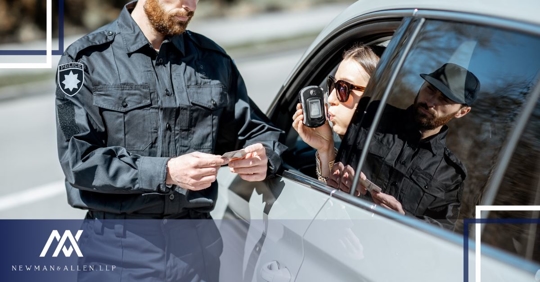Your defense doesn’t start after your arrest – it starts during your traffic stop. Our attorneys have put together this list of tips and information regarding what you should do during a DUI traffic stop to protect yourself and help your future defense.
1. Provide Required Information
When you are pulled over, the first thing police will ask for is your license, registration, and proof of insurance. You are required by law to provide this identification and documentation.
You may also consider telling the police that that is what you are reaching for within your vehicle. If it is dark outside, they may not be able to see well inside your vehicle. Any fast or sudden movements could be misinterpreted as threatening. Instead, let them know the documents are in your glove compartment before you reach for them.
2. Be Polite
Many people feel frustrated, angry, scared, or have other negative emotions when pulled over by the police. However, you don’t want to act this way toward the police officer. Instead, be polite in all of your interactions. You should remain respectful even if you feel the officer is becoming accusatory or harsh with you.
If you let your negative emotions show and you become hostile toward the officer, it could:
- Make them more likely to arrest you
- Cause the situation to escalate and become dangerous
- Lead to additional charges, like disorderly conduct
3. Don’t Guess Why They Pulled You Over
At the beginning of the traffic stop, the officer may ask if you know why you were pulled over. Even if you think you know, say you don’t. Do not give a reason for the stop.
This has two different consequences:
- Acknowledging a reason for the stop implies some knowledge of wrongdoing on your part.
- The officer now has something they can cite as the reason for the stop.
The officer may not have had a solid reason to pull you over to begin with. However, if you provide a reason, they can then use this as their justification for the stop.
4. Don’t Admit To Drinking
This step is crucial. If you are stopped for suspected DUI, the police officer will most likely ask you if you’ve been drinking. If you haven’t, you can be honest and say no. If you have had one or more drinks, you should not say yes or admit to consuming any alcohol. Some people believe they must answer honestly no matter what. However, this is self-incriminating. You have the right to remain silent and you should use it in this instance.
After the police officer asks, “Have you had anything to drink today/tonight?” You should respond with, “I’m using my right to remain silent until I have spoken with an attorney.”
It’s also important to explicitly state that you are using your right to remain silent, pleading the fifth, etc. If you do not say this but instead just sit silently, that silence can be used as evidence against you. However, if you acknowledge that you are using your right to remain silent before remaining silent, your refusal to answer questions cannot be used against you in court.
5. Know Your Rights
You have rights when interacting with the police, and you must know them before your DUI stop.
You have:
- The right to remain silent
- The right to refuse a warrantless search of your vehicle
- The right to refuse field sobriety tests
Knowing and using your rights is the best way to protect yourself from criminal DUI charges or a conviction.
Rancho Cucamonga DUI Defense
If your DUI stop ended with an arrest, your next step should be to contact our DUI defense team at Newman & Allen. We want to help you fight your charge and keep a DUI conviction off your record. Discuss the details of your case with our team today; call us at (909) 328-6101 or request a consultation using our online contact form.

